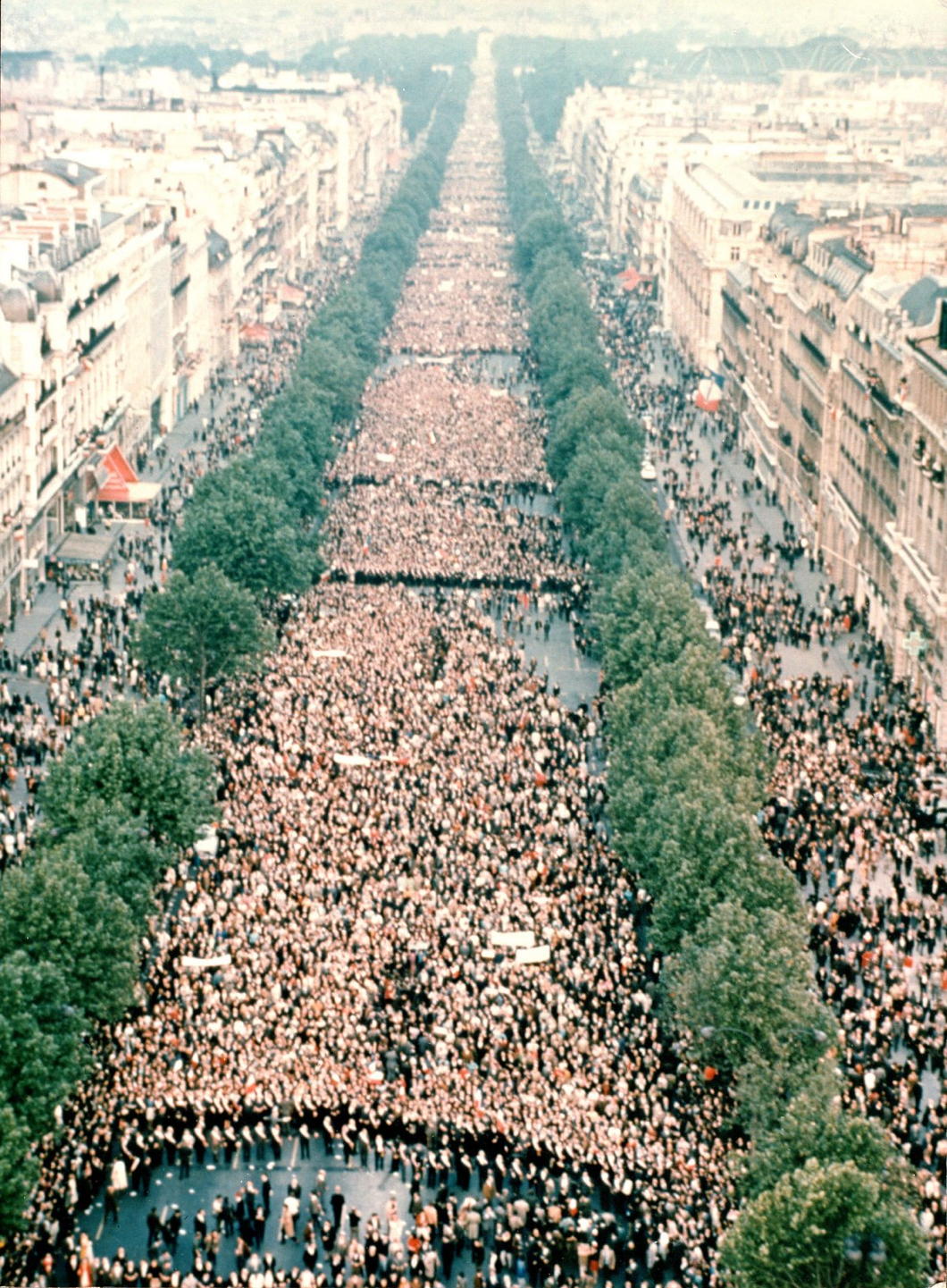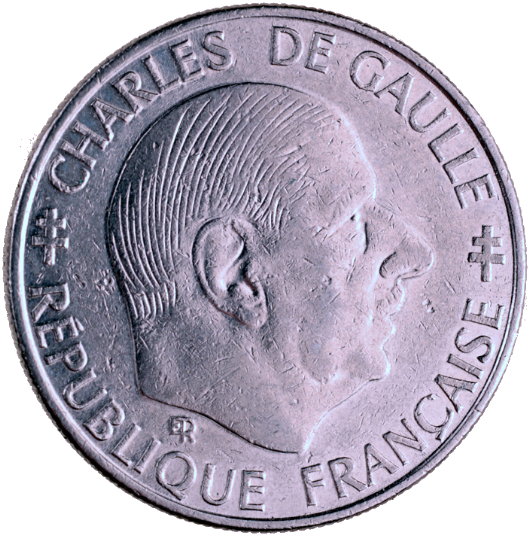Charles De Gaulle
About Andrew Cusack
 Writer, web designer, etc.; born in New York; educated in Argentina, Scotland, and South Africa; now based in London.
Writer, web designer, etc.; born in New York; educated in Argentina, Scotland, and South Africa; now based in London. read more
News
Blogs
Reviews & Periodicals
Arts & Design
World
France
Mitteleuropa
Knickerbockers
Argentina
The Levant
Africa
Cape of Good Hope
Netherlands
Scandinavia
Québec
India
Muscovy
Germany
Academica
De Gaulle on the Market
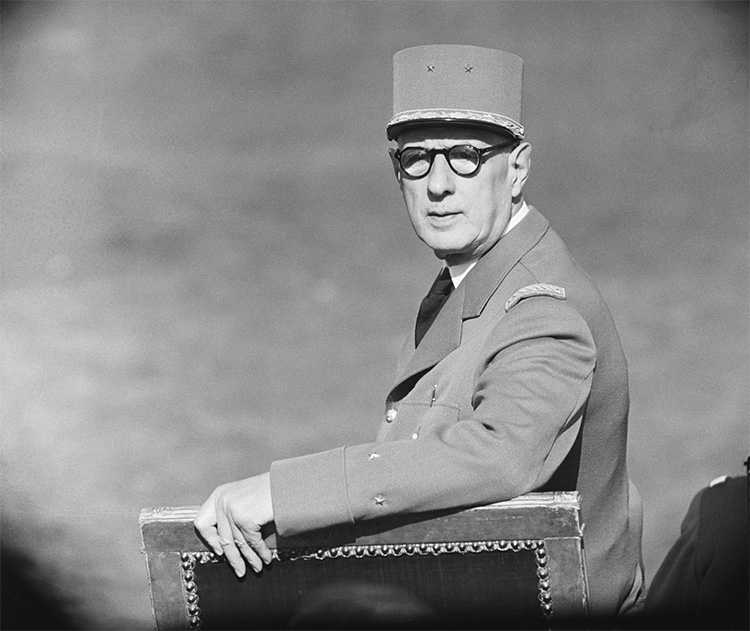
It forces people to stretch themselves, it gives a bonus to the best, it encourages you to surpass others and to surpass yourself.
But, at the same time, it creates injustices, it establishes monopolies, it favours cheaters.
So don’t be blind to the market. You should not imagine that it will solve every problem on its own.
The market is not above the nation and the state. It is the nation, it is the state which must oversee the market. »
Gaullist California
A friend well conversant in my ongoing crusade to remind today’s centre-droit of the utility of the Gaullist experience writes in:
The Golden State once practised a very successful form of Cal-Gaullism, developing world-class infrastructure, research universities, new industries… and much of the place was solidly conservative.
Once upon a time, parts of Southern California (including Orange County) were deemed the most conservative places in America, from which Nixon, Reagan, and others sprang.
San Francisco, though still beautiful, is certainly now well past its prime; I remember that white tie and tails were still seen there regularly as late as the ’80s.
The Polish church in Los Angeles was built to serve the large number of Polish exile families (with fathers who were aerospace engineers trained in the RAF like mine) who came from the UK and Canada to work in what was then the world centre of the aerospace and defence industry — “the Gunbelt in the Sunbelt”.
L’Élysée à la plage
The Fort de Brégançon: Riviera Retreat of France’s Presidents
When France’s head of state needs to let his hair down every summer, the Republic has a convenient presidential residence just for him to do so: the Fort de Brégançon on the Côte d’Azur.
There has been a fortress here since at least mediæval times, and Gen. Buonaparte (later emperor) ordered its ramparts renewed after the retaking of Toulon in 1793. It continued to serve military purposes until 1919, but in 1924 it was leased out to a local mercantile family, the Tagnards.
They passed their lease on to the former government minister Robert Bellanger, who improved the island greatly, connecting it to the water and electricity supply, building the causeway linking it to the mainland, and laying out the Mediterranean garden. Bellanger’s leased expired in 1963 and Brégançon returned to the property of the state.
President de Gaulle stayed a night on the island in 1964 but found the bed too small and the mosquitos too bothersome. Nonetheless, his wartime comrade René-Georges Laurin (mayor of Saint-Raphaël up the coast) convinced him it would make a suitable summer residence that befitted the dignity of France’s head of state.
The architect Pierre-Jean Guth was seconded over from the Navy to adapt and update the fort to this end. The rooms are a little small, but their cozy intimacy adds to the fort’s informality. The presidential bedroom features a Provençal bed facing the sea with a view towards the nearby island of Porquerolles.
Pompidou and Giscard enjoyed the island but Mitterand mostly neglected the island except when welcoming Chancellor Kohl and Taoiseach Garrett Fitzgerald. Chirac and his wife took up Brégançon and were often seen by the locals on their way to Mass.
Sarkozy liked to be photographed on his jogs from the island but after he abandoned his wife and took up with his mistress he preferred holidaying at Carla Bruni’s far grander and more comfortable summer residence.
Hollande opened the fort up to public visitors, hoping to recoup some of the costs of maintaining the property. Macron has taken to the island frequently for his summers, for meetings with foreign leaders, and for working weekends with his ministers.
With summer fires raging, a minority in parliament, and myriad other problems brewing, no doubt Macron has much on his agenda.
All the same, for France’s sake, we can’t help but hope Monsieur le Président has a happy holiday. (more…)
30 mai 1968
The events of May 1968 have been fetishised by the romantic radical left but ended in the triumph of the popular democratic right. Battered by two world wars, France had enjoyed an unprecedented rise in living standards since 1945 — especially among the poorest and most hard-working — and a new generation untouched by the horrors of war and occupation had risen to adulthood (in age if not in maturity). The ranks of the middle class swelled as more and more people enjoyed the material benefits of an increasingly consumerised society, while those left behind shared the same aspirations of moving on up.
Like any decadent bourgeois cause, the spark of the May events was neither high principle nor addressing deep injustice but rather more base impulses: male university students at Nanterre were upset they were restricted from visiting female dormitories (and that female students were restricted from visiting theirs). The ensuing events involved utopian manifestos, barricades in the streets, workers taking over their factories, a day-long general strike and several longer walkouts across the country.
The French love nothing more than a good scrap, especially when it’s their fellow Frenchmen they’re fighting against. Working-class police beat up middle-class radicals but for much of the month both sides made sure to finish in time for participants on either side to make it home before the Métro shut for the evening. But workers’ strikes meant everyday life was being disrupted, not just the studies of university students. When concessions from Prime Minister Georges Pompidou failed to calm the situation there were fears that the far-left might attempt a violent overthrow of the state.
De Gaulle himself, having left most affairs in Pompidou’s hands, finally came down from his parnassian heights to take charge but then suddenly disappeared: the government was unaware of the head of state’s location for several tense hours.
It turned out the General had flown to the French army in Germany, ostensibly to seek reassurance that it would back the Fifth Republic if called upon to defend the constitution. De Gaulle is said to have greeted General Massu, commander of the French forces in West Germany, “So, Massu — still an asshole?” “Oui, mon général,” Massu replied. “Still an asshole, still a Gaullist.”
The morning of 30 May 1968, the unions led hundreds of thousands of workers through the streets of Paris chanting “Adieu, de Gaulle!” The police kept calm, but the capital was tense and there was a sense that things were getting out of hand. Pompidou convinced de Gaulle the Republic needed to assert itself.
Threatened by a radicalised minority, de Gaulle called upon the confidence of the ordinary people of France. At 4:30 he spoke on the radio briefly, announcing that he was calling for fresh elections to parliament and asserting he was staying put and that “the Republic will not abdicate”.
Before the General even spoke some his supporters (organised by the ever-capable Jacques Foccart) were already on the avenues but the short four-minute broadcast inspired teeming masses onto the streets of central Paris, marching down the Champs-Élysées in support of de Gaulle.
Anglo-Gaullist Reading Update
The latest round of news or commentary of Gaullist content or interest:
Mercator: Charles de Gaulle: a wise ruler of France
Financial Times: France invokes the golden age of de Gaulle
Politico: Why all French politicians are Gaullists
Variety: Cliché-Ridden ‘De Gaulle’ is Unworthy of Its Iconic Subject
Problems and Solutions
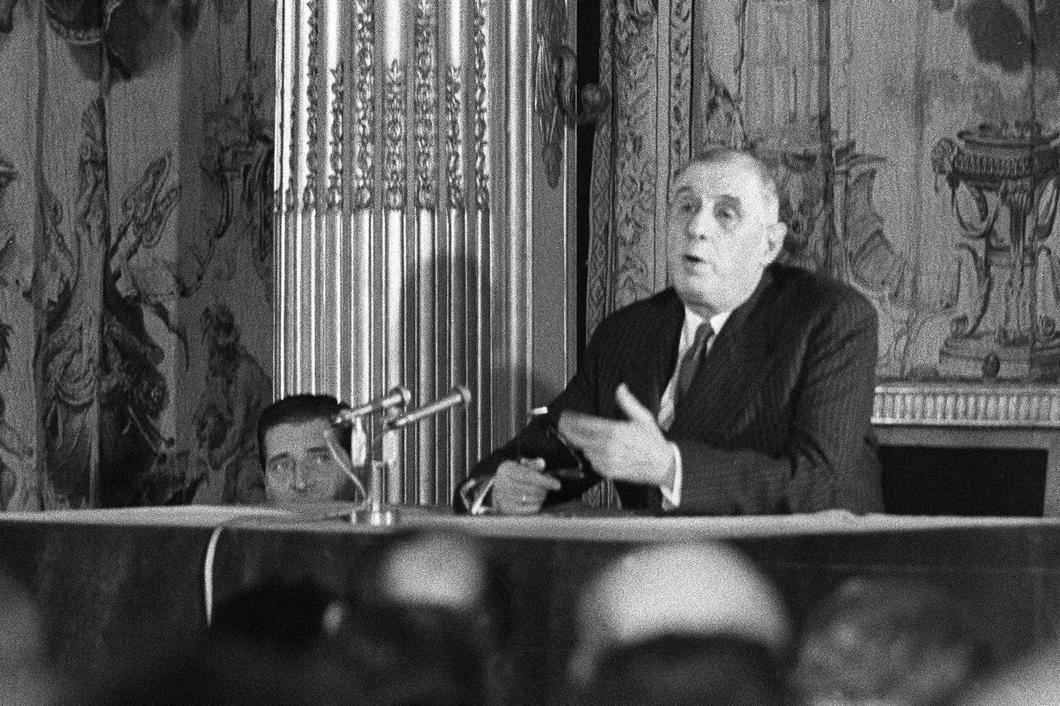
There are in some periods problems to which no solutions exist.”
An Interview with Philippe de Gaulle
Last year, in advance of the Admiral’s ninety-ninth birthday and the fiftieth anniversary of his father’s death, Paris Match sent Caroline Pigozzi to interview Philippe de Gaulle.
What follows is an abridged and completely unofficial translation of what Admiral de Gaulle insists will be his “last interview”.
ADMIRAL PHILIPPE DE GAULLE: Everyone has appropriated their share, even the Communists. All those who refer to General de Gaulle’s policy respect his Constitution, that of the Fifth Republic…
But, over the elections, my father’s imprint has faded. Pompidou, he was not quite his ideas anymore. Giscard d´Estaing, even less so… Mitterrand, basically, had the ideas of General de Gaulle, but he could not say it.
How do you judge the current president?
Emmanuel Macron is quite right to reference himself to the General as well as to other heads of state — France comes from the depths of the ages and the centuries call for it.
However, he is too involved in parliamentary life: the president should have a little more perspective. But anyway, it’s a Gaullist talking to you! The head of state is above Parliament and the government he appointed. It’s up to them to discuss day-to-day business. He has a prime minister who has to fight every day with his ministers and with Parliament.
And it’s up to the president, of course, to give direction, to choose. It is his “job”, just like dealing with the health crisis, which cannot stand any delay.
Which annual ceremonies have marked you the most?
The parade of 14 July, a commemoration of real scale which bears witness to the victories of the Republic.
My father would have liked to have celebrated on November 1 and 2 [All Saints’ and All Souls’ days] the remembrance of all war dead, for families, but that there were no other commemorations.
Why continue indefinitely with November 11, which marks the armistice of 1918, and May 8, the victory of 1945? Leave the public holidays to which the French are so attached, and let the state stick to these two dates.
Did your father like sports?
It was very important for him, because it marked the vitality of France. In his eyes, a country that had no athletes was a country half-dead.
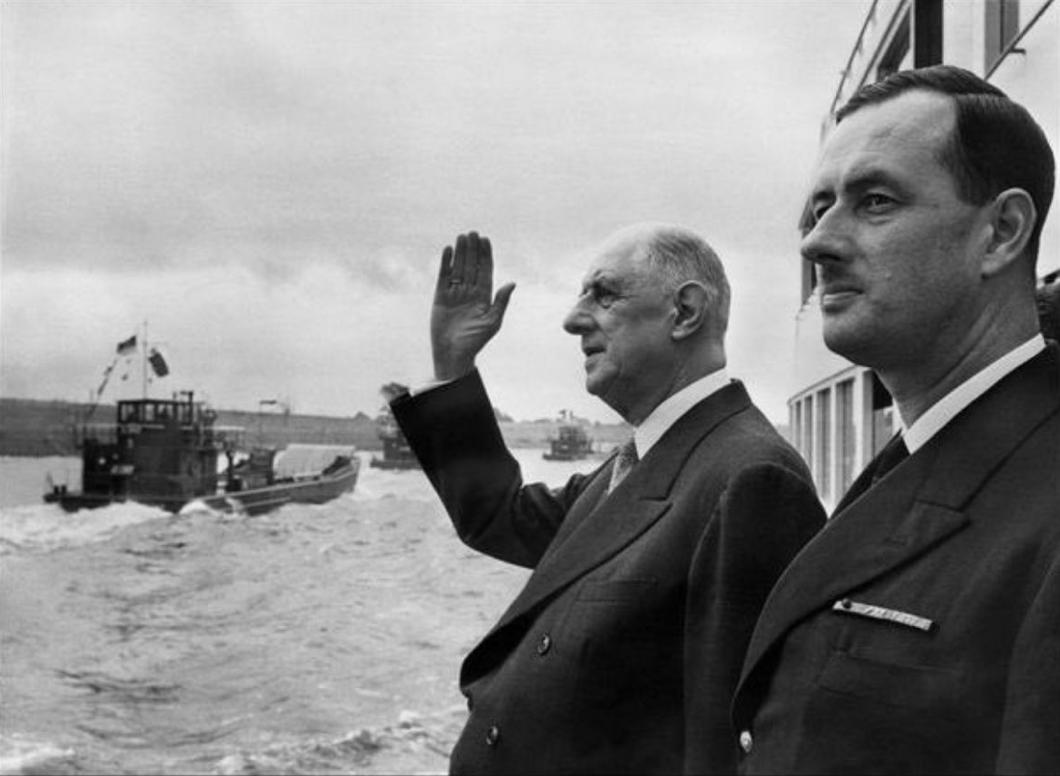
Did he read the press?
He watched the news every night — it interested him to see what the French saw.
And, of course, he read Paris Match every week. I’m not saying that to flatter you: your newspaper is the only one that reported on La Boisserie during his lifetime.
He also read the dailies, even [the Communist] L’Humanité, but not always Le Monde, which he called for a time L’Immonde [“the foul”].
Do you know that it was de Gaulle who founded it? We do not mention it, but it’s the truth! Just after the war, in his office in rue Saint-Dominique, he asked Pierre-Henri Teitgen, Minister of State for Information, to find a journalist with a resistance background and recognised competence. The name Hubert Beuve-Méry was put forward.
My father summoned him: “You are going to make a newspaper like Le Temps before the war, which is politically neutral and with columnists. I’ll give you the money and the paper.
The first issue didn’t mention the General; in the second they started writing against him. In fact, Beuve-Méry never stopped running a pro-Fourth Republic daily, criticizing de Gaulle…
In another style, later on, my father discovered “Tintin” and “Asterix” thanks to my children, immersed in these readings during their vacations in Colombey.
Why was your mother known colloquially as “Aunt Yvonne”?
It was a nickname, as it sounded like Becassine. The truth is, people initially thought she was clumsy or frumpy. She wore her hair in a bun then, never interfering in anything.
She would go to see nuns for her charitable work, but on condition that no reporter showed up. Otherwise, she would turn right around.
You have never heard my mother speak of her charitable work, although she was devoted to it all her life! Sometimes I went with her. One day, with her, with nuns caring for hearing-impaired boys aged 4-5, the sisters played the piano for them and they put their little heads close to the keyboard. Poor people!
My mother had a knack for tackling little-known causes. She ended her life in the retirement home of the Sisters of the Immaculate Conception in Paris. There she was sure the nuns would neither speak to nor receive journalists.
Did the General use the familiar form “tu” easily?
He said “vous” to women, “tu” was more often used for regimental comrades. But he never used the familiar with men, out of a sense of honour. Not even the Companions of the Liberation! How could he have said “tu” to a soldier? People who fight, risk their lives, deserve a certain dignity. Even if they are not worthy elsewhere…
My father vouvoyer-ed my two sisters, used “tu” with my sons, but not his granddaughter. My sister and I vouvoyer-ed our mother, and she tutoyer-ed all of us.
As for my father with his wife, sometimes he was formal, sometimes he was familiar — but in public it was generally “vous”. Me, he was familiar with me and I used “tu” with him.
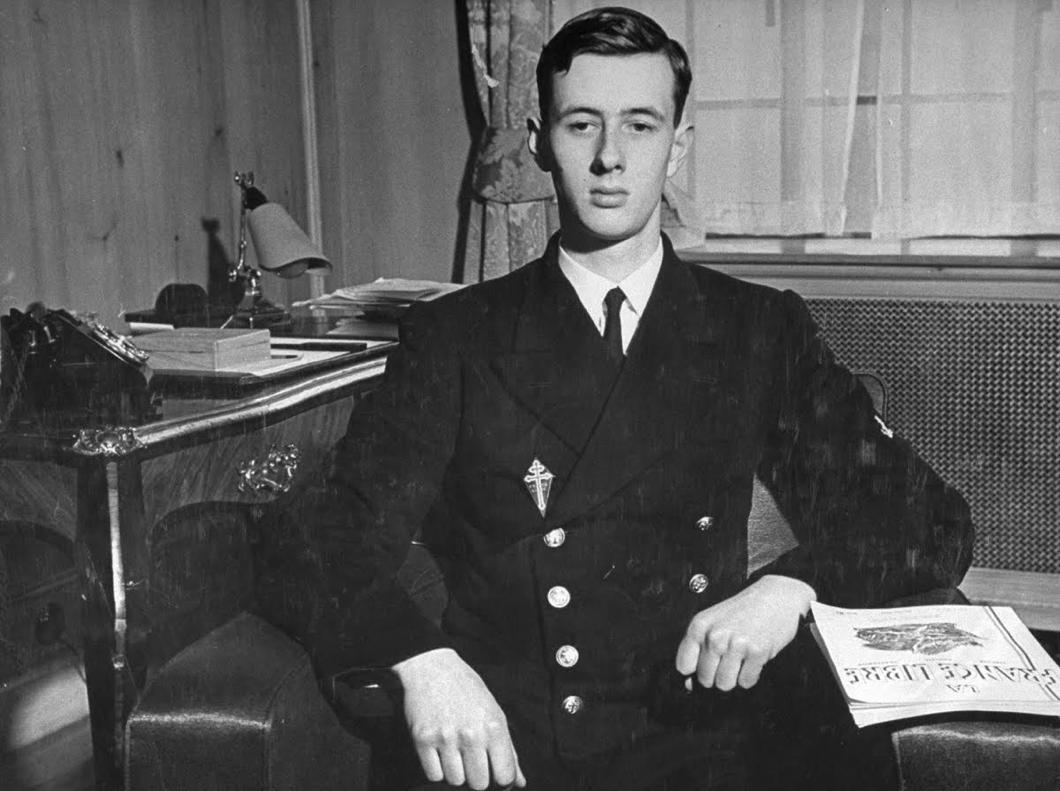
Your father should have made you a Companion of the Liberation.
He hesitated and said to me, “After all, you were my first companion.”
I replied: “Not the first, the second after your aide-de-camp, Geoffroy de Courcel.”
“Yes, but I cannot name you companion, because then I would have to name three times as many and I cannot do it. Everyone will know that you were one of my first companions.”
(The admiral, his voice charged with emotion, will say no more.)
The last companion of the Liberation will be buried in the crypt of Mont Valérien.
This is the rule they drew up, and the General endorsed it. They settled it a bit like the Marshals of the Empire — when the Companions were united with their first chancellor, Admiral Georges Thierry d’Argenlieu, a monk-soldier who then returned to the Carmel under the name of Father Louis de la Trinité.
After the war, they chose to commemorate the Appeal, every June 18, outside the official state — that is to say not at the Arc de Triomphe but at Mont Valérien, where more than a thousand hostages and resistance fighters had been shot. They erected a wall and a crypt, the Fighting France Memorial, and decided that the last of them would rest there.
Of the 1,038 who received the Order of Liberation, including 271 posthumously, they are now only three: Pierre Simonet, 99 years old, formerly a soldier, Daniel Cordier, centenarian, former secretary of Jean Moulin then merchant of art, and Hubert Germain, the dean of the order, also a hundred years old, who was deputy then minister under Georges Pompidou. He was supposed to join the navy with me and I found him on the “Courbet”, but he ultimately didn’t want to be a sailor anymore.
My father created the order on 16 November 1940 to reward individuals, civilian and military units, and civilian communities working to liberate France. He maintained a special bond with his Companions from all walks of life and from all political parties, even the Communist Party…
[Hubert Germain, the last Companion, died earlier this year and was buried at Mont Valérien after being recognised with full honours at Les Invalides.]
Father Euvé, the Jesuit who heads the prestigious review Etudes, explains that the Society of Jesus educates people for great destinies.
No less than two presidents under the Fifth Republic: de Gaulle and Macron!
It is clear that the Jesuits teach the meaning of the state and how to present oneself. Emmanuel Macron, a former student of La Providence in Amiens, a Jesuit institution, indeed has this talent.
Certainly he should speak a little more briefly, but he presents himself well and he is young. For me, he has not exhausted his full potential… And if he goes, who will be there? Tell me! I don’t see anyone else at the moment.
But back to the Jesuits, where my father studied. As a kid, I was in Saint-Joseph in Beirut, but it was the nuns who took care of us. Charles de Gaulle, on the other hand, attended the College of the Immaculate Conception, rue de Vaugirard, in Paris, which is now closed. His father taught there and was even its lay director after the expulsion of the Jesuits in 1901.
What a training! You should know that when a seminarian enters the Jesuits, he begins his studies again for nine years. Jesuits have a taste for the state and a sense of power. They educate people for administration, science, exploration, astronomy… So it’s important first, I stress, to know how to present yourself. Thus, the theater, rich in lessons, helps in this.
Was the General’s piety one of their legacies?
For him, life did not exist without the Creator. He could not believe in a universe that emerged out of pure chance and found the Catholic religion to be the most human, the most balanced, the one that accompanied you best until the end, and that had given rise to the most sacrifices and dedication.
The General had a deep fervour throughout his existence, with great Christian roots, marked among others by the readings of Jacques Maritain and Charles Péguy, and also by the Jesuits. It corresponded to an intimate devotion, to an interiorisation of his faith, that of a being active in the world who did not keep his baptismal certificate in his pocket.
Doesn’t France have centuries of Christianity behind it? However, in the courtyard of the Elysée, laïcité oblige: there was no waltz of cassocks.
On the other hand, remember, in 1946 it was picturesque to see, for example, Canon Kir and Abbé Pierre sitting amidst the benches of the National Assembly.
Nevertheless, men of God must be concerned with the spiritual and, in a certain way, the social.
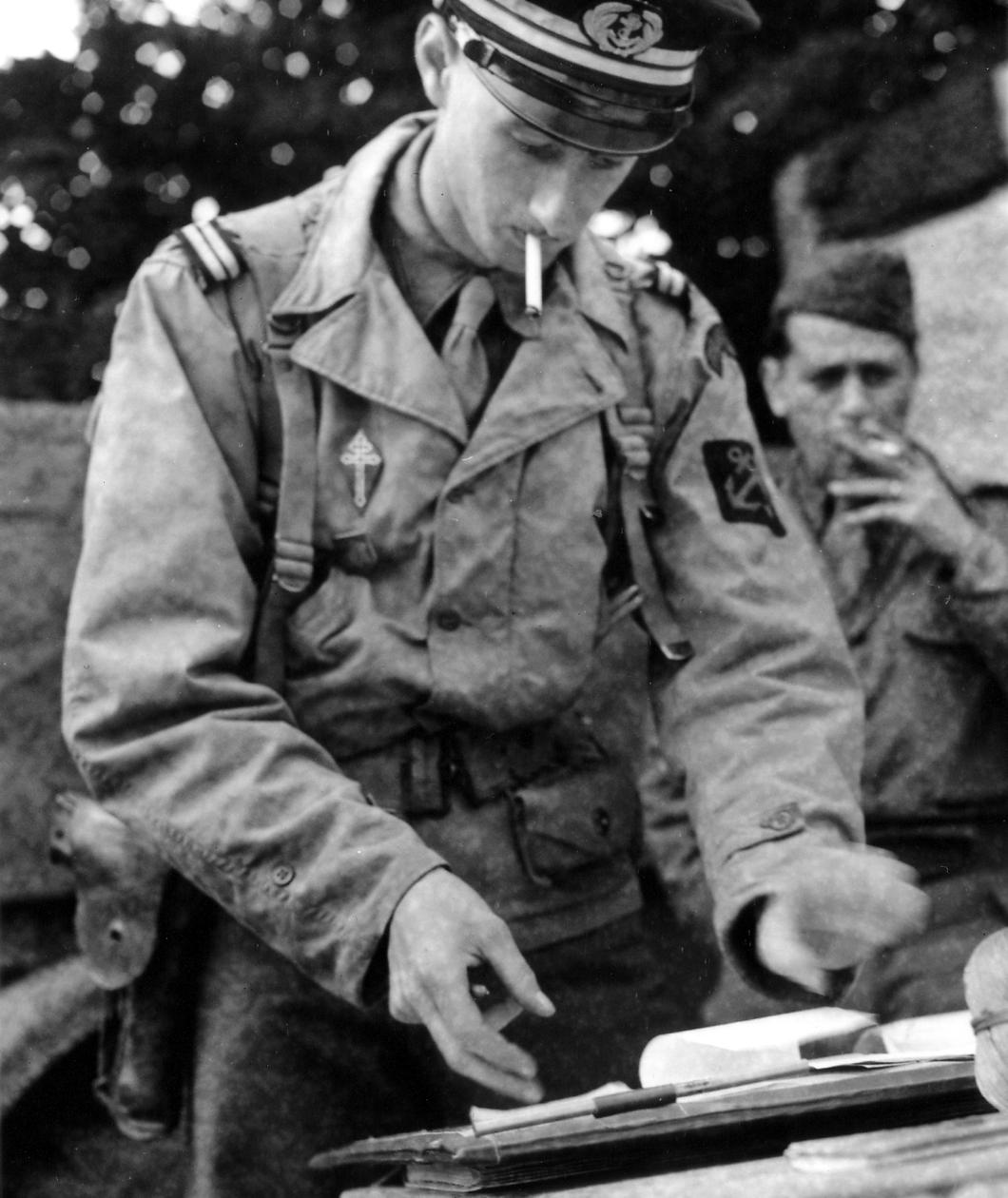
Admiral, tell us about your second professional life.
Indeed, from September 1986 to September 2004, I was in the Senate for the RPR and then elected a UMP city councillor in Paris.
Chirac had come to get me for the municipal elections. We campaigned all over the capital and, on March 6, 1983, he snatched eighteen out of twenty arrondissements!
It was until I was 84 — the age at which my maternal grandfather died, which at the time seemed very old to me — that I was a senator for Paris. Although the cliché of the senator dozing after meals is outdated, it was no longer the navy when I was constantly running around. An admiral is a fellow who moves from boat to boat, day and night.
How did you experience the lockdown?
I haven’t been out at all but, as I’ll be 99 soon, that doesn’t really matter! It was sometimes awkward to get to the bank or run an errand as I’m now a widower on my own.
I can’t walk anymore. Taking five steps one way and five the other, your knees are rusting. Many old people are dead, masked, “emblousinés”.
My children brought me fruit but it had to be put in a bag — it was all very compartmentalised.
And how is your daily life going now?
When everything is going well, I get visits from time to time from my family — my four sons gave me six grandchildren and two great grandchildren.
I read a lot of history books; I answer a lot of the mail that mostly comes from the descendants of Free French people. I listen to classical music, I watch the big games of tennis, rugby, football on television.
And also the James Bond films, films by Melville, Louis de Funès like ‘Le Petit Baigneur’, westerns, and documentaries on animals, nature with its distant landscapes, deserts, the Far North… There are magnificent places, countries where I have not been and where I will never go: Mongolia, the Himalayas… I only did mountaineering on screen. (He laughs.)
Was the cinema one of the General’s rare “distractions”?
He liked to see films, pre-war comedians and great actors such as Charles Boyer, Fernandel, Louis de Funès… He also liked Michèle Morgan, whom he found quite jolie, with a lot of allure, acting well.
At the Elysée Palace, having little time, he mainly watched the news. This had led to some myths, such as that of an announcer who was said to have been kicked out because my mother thought it was inappropriate for her to show her knees. Completely ridiculous! My mother did not get involved in this, especially since those in the audiovisual sector were more for de Gaulle, while the print media were often against him.
Has President Macron come to visit you, a few days before this historic anniversary?
Why would he do that? Be serious: he has no time to waste! He already sees far too many people and, at almost 99 years old, you are just a vestige of yourself.
[But on this, Admiral de Gaulle’s 100th birthday, President Macron has issued a communiqué.]
A vestige with the great pride of being called de Gaulle!
I admit I found it heavy, but hey, that’s how it is. We don’t choose such things. Carrying this name hindered my own freedom, constrained me to a lot of discretion. Besides, I joined the navy so as not to be in the army, where I would have had an impossible life. The navy is looking out to sea!
Lastly: write it down that this is my last interview. I insist! I am now too old for that. And don’t tell my sons that I gave you an interview. I’ll have to tell them that it was you who caught me, “caught” me. So, thank you for the photos, the historic Paris Matches and the cake. I shouldn’t eat cake anymore… At my age, sugar isn’t very good!
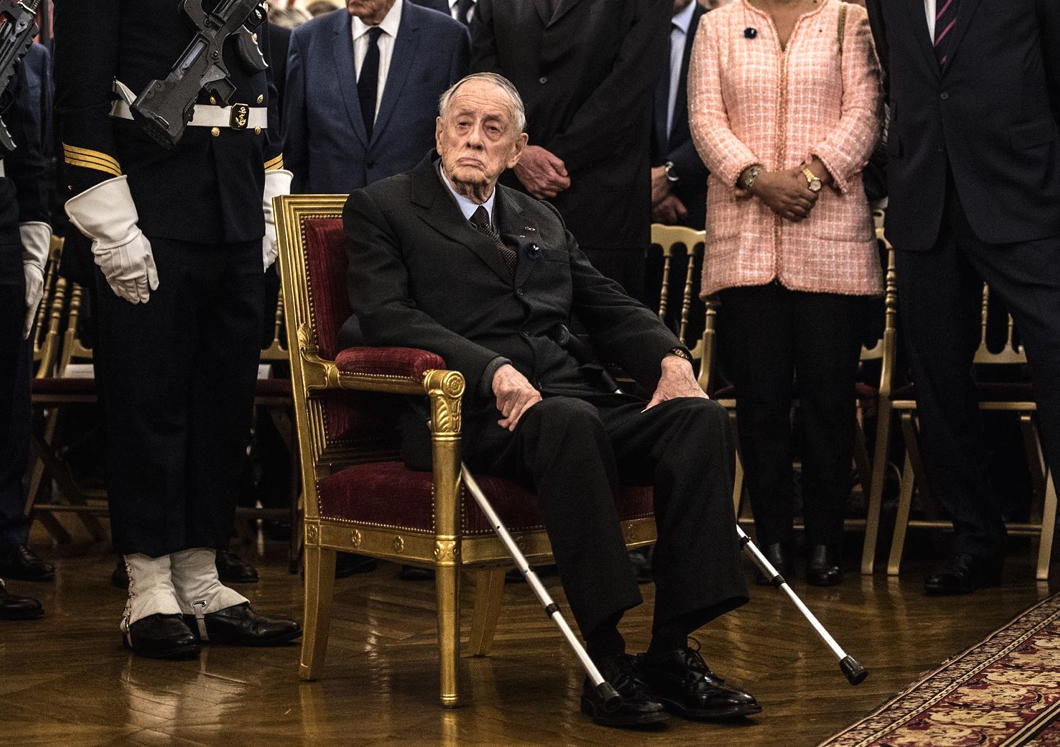
Fifth Republic Britain
An Anglo-Gaullist Reading Round-up
While I’m a big Adenauer fan there’s little doubt that de Gaulle was the greatest European statesman of the twentieth century and an historical figure of such a position will always be the subject of interest.
Both Jonathan Fenby’s 2010 book The General: Charles de Gaulle and the France He Saved and Dr Sudhir Hazareesingh’s 2012 In the Shadow of the General: Modern France and the Myth of de Gaulle received wide notice, but neither as much as Julian Jackson’s 2019 A Certain Idea of France: The Life of Charles de Gaulle.
Jackson’s work is indeed magisterial and Lord Sumption’s praise of it as “the best biography of de Gaulle in any language” is only just an exaggeration. (For a strong bibliography of works on the general, see the appendix of Charles Williams’s 1993 The Last Great Frenchman: A Life of General de Gaulle.)
Study of the life and contradictions of de Gaulle is always worthwhile, but many spy a Gaullist moment in the Tory party’s refreshingly surprising turn away from ideological liberalism towards a more pragmatic conservatism under Boris Johnson.
Painting Johnson as Britain’s first Gaullist prime minister would be a stretch, but there is certainly some crossover: nationalist, economically interventionist, focused on national sovereignty and national exceptionalism.
■ Eliot Wilson pointed out this summer that Boris has always been difficult to classify in ideological terms.
■ Speccie political editor James Forsyth wrote in The Times that Boris the Gaullist puts action over ideas. Just before the party conference Forsyth also predicted the PM’s speech would be “in line with his recent Gaullist turn”.
■ QMUL’s Nick Barlow explores the parallels between de Gaulle’s Fifth Republic and Boris’s style of government.
■ Meanwhile Aris Roussinos argues that de Gaulle was always right in vetoing British entry into the EEC, and that true-blue FBPE types should welcome Brexit as advancing the cause of European integration.
■ Dean Godson (New Statesman) says that Defence Secretary Ben Wallace is pursuing “almost Gaullist trajectory for future British policy”.
■ When asked (on GB News) where he sits on the political spectrum, national treasure Peter Hitchens expressed his surprise that the Gaullist combination of “strong defence, patriotism, a strong welfare state, and national independence” isn’t more common in British politics.
■ ‘Bagehot’, the political column in The Economist, put it that the man who rebuilt post-war France has some important lessons for Britain’s prime minister: What Boris could learn from de Gaulle.
■ The American Conservative embarrassingly illustrated a piece on Europe’s Gaullist Revival with a picture of General Kœnig. (Always check the képi — as a brigadier general, de Gaulle only had two stars!)
■ Mike Bird discerned some Anglo-Gaullism in a pile of recent newspaper headlines.
■ As long ago as 2017 — what a world away that was! — Prospect argued in a somewhat rambling piece that the Brexiteers were Britain’s new Gaullists.
■ Honourable mention: Frederick Studemann chides Churchill and dumps de Gaulle, saying Boris should model himself on Bismarck and make for a Prussian Brexit.
But, for all this, when New Labour bigwig John McTernan suggested that Boris is not a Churchill but a de Gaulle, the great Julian Jackson himself pointed out there are still great differences between the PM and le général.
All the same, I’m welcoming our Anglo-Gaullist future with open arms.
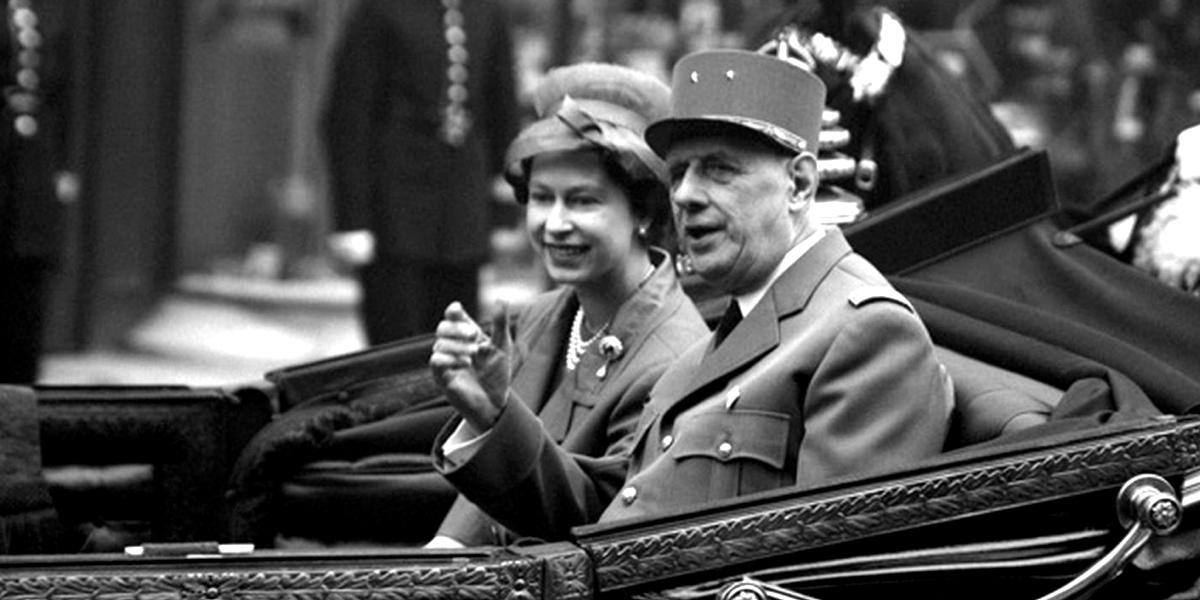
Articles of Note: 23.XI.2020
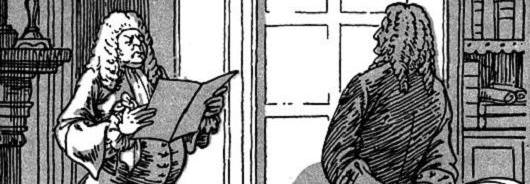
• France’s Year of de Gaulle has marked the fiftieth anniversary of his death earlier this month and what would have been the general’s one-hundred-and-thirtieth birthday yesterday. Julien Nourian has put together a Weberian analysis of the general and his charismatic mystique.
• President Trump is a very different kind of leader to de Gaulle, and his chances of continuing in the White House are not looking great at the moment. (Our head of legal in New York thinks he’s still got a chance, however.)
Regardless of who will be inaugurated in January of next year, Trump managed to win the highest proportion of minority votes of any Republican candidate since 1960 (when the GOP choice was a member of the NAACP). Meanwhile, Trump lost votes among old, white, well-to-do men.
What is the future of American political conservatism? Ben Hachten points out It’s Not Your Father’s GOP.
New England poli-sci professor Darel E. Paul explores The Future of Conservative Populism, pointing out the big increase in the Hispanic vote for Trump — especially Hispanics living in Texas along the Mexican border.
• In Britain, Ferdie Rous says the Conservative party is having difficulty reconciling the business wing of the party with our rural roots, but suggests that The writings of Lewis and Tolkien embody conservative environmentalism.
Meanwhile David Skelton asserts It was working class voters who delivered this majority – and Johnson must not abandon them now.
• Here in London we’re still in the middle of the second lockdown. Instead of following the science, governments around the world are implementing the exact opposite of effective measures to combat the pandemic. It’s The Greatest Scandal of Our Lifetime according to R.J. Quinn.
• We can always do a with a dose of Metternich and Wolfram Siemann’s 900-page doorstop has provided a chance for many to analyse the master diplomat. Ferdinand Mount examines The Prime Minister of the World.
• And finally, the Museum of Literature Ireland features an online exhibition on the American writer, speaker, reformer, and statesman Frederick Douglass’s visit to Ireland 175 years ago. (Available as Gaeilge too.)
Roots and Permanent Interests
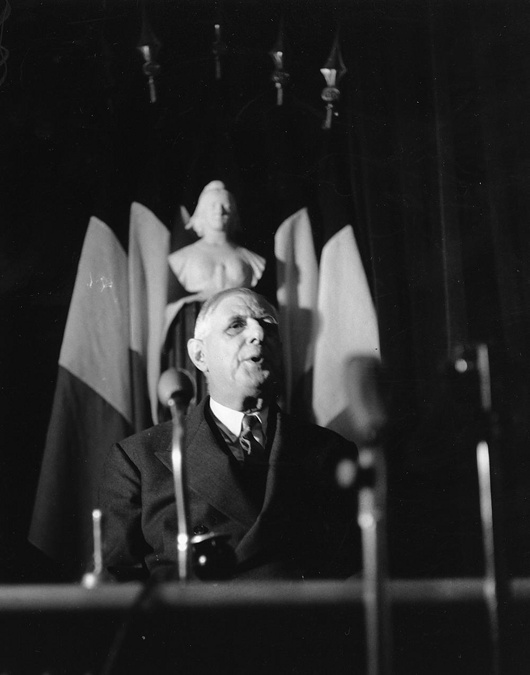
Justice in the Royal Gallery
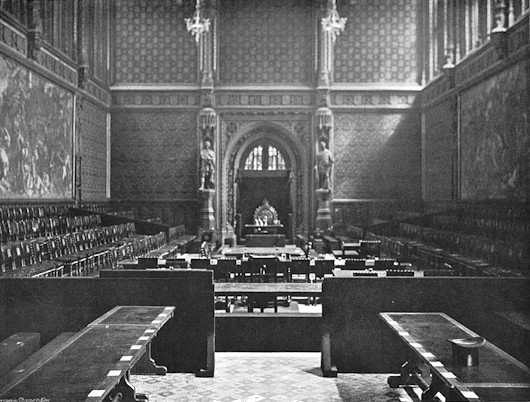
One of the great triumphs of Magna Carta was the assertion of the right of those accused of crimes to trial by one’s peers, or per legale judicium parium suorum if you insist on the Latin. For commoners this meant trial by other commoners, but for peers it meant just that: trial by other peers of the realm. It was a bit murkier for peeresses, though after the conviction for witchcraft of Eleanor, Duchess of Gloucester, (sentence: banishment to the Isle of Man) statute was passed including them in the judicial privilege of peerage.
Thanks to the ’15 and the ’45, there were a number of trials in the House of Lords in the eighteenth century, including that of the Catholic martyr Earl of Derwentwater. The whole of the nineteenth century, however, witnessed but one: the 7th Earl of Cardigan was acquitted of duelling by a jury of 120 peers. In 1901 the 2nd Earl Russell was found guilty of bigamy, and the last ever trial came in 1935 when the 26th Baron de Clifford was found not guilty of manslaughter.
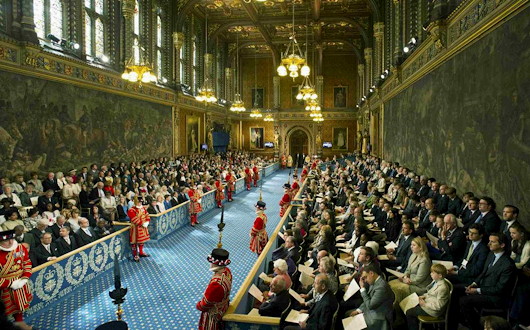
Cardigan’s trial was in the temporary Lords chamber while the last two trials took place in the Royal Gallery of the Palace of Westminster (central to current debates over renovation plans). For Cardigan’s trial the Lord Chief Justice of the Queen’s Bench was appointed Lord High Steward for the occasion, while for the final two the Lord Chancellor was likewise appointed to the role in order to be presiding judge with the Attorney General prosecuting the case.
The Royal Gallery is primarily used for the State Opening of Parliament (as above) and for the occasional address to both Houses of Parliament when important figures are invited to do so. De Gaulle was famously invited to speak here to both houses rather than in the larger Westminster Hall. It is thought that this is because the walls of the Royal Gallery feature two large murals, one of the Battle of Trafalgar, the other of the Battle of Waterloo – both British victories over the French.
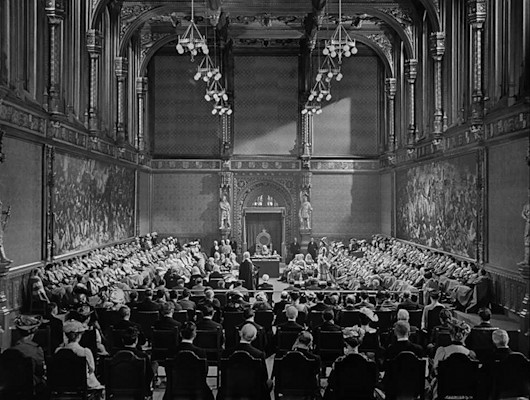
The most famous trial in the Royal Gallery was fictional. In the 1949 Ealing comedy “Kind Hearts and Coronets”, the 10th Duke of Chalfont is tried for the one murder in the film’s plotline he didn’t actually commit. Ealing Studios did a mock-up of the chamber for the occasion (above), which compares reasonably accurately with the Royal Gallery as set up for the Baron de Clifford’s trial in 1936 (below).
The Lords, however, were uncomfortable with exercising this judicial function and passed a bill to abolish the privilege in 1937. The Commons, facing more serious tasks, declined to give it any attention. In 1948, the Criminal Justice Act abolished trials of peers in the House of Lords, along with penal servitude, hard labour, and whipping.
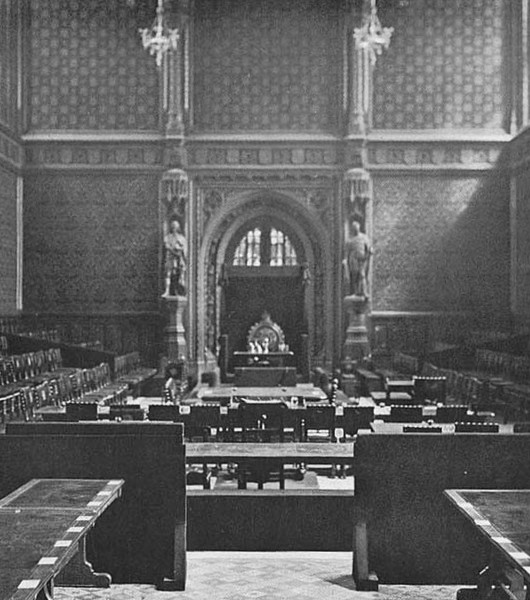
Fillon: Which Right?
A Rémondian Analysis of the French Presidential Candidate
One of the most significant contributions of the historian and political scientist René Rémond was his theory regarding the tendencies of the French right wing. He contended that, broadly speaking, there are three right wings in France: legitimist, bonapartist, and orleanist. These terms are not bound by their historic use, but rather (Rémond argued) serve as useful guides to understanding French conservatism today.
Gaullism, for example, with both its populism and its reliance on the authority of a charismatic leader, is classified as bonapartist. Social conservatism, meanwhile, with its affinity for the Church and for tradition, comes in under legitimism. And economic liberalism — the bourgeois supremacy of the markets — is orleanist.
What to make of the current presidential candidate of the French right, M François Fillon? The Québécois website Dessinons les élections (“Let’s draw the elections”) sought to apply a Rémondian analysis of Monsieur Fillon in one of its weekly cartoons (by Frédéric Mérand & Anne-Laure Mahé).
Their conclusions are as follows:
Legitimism: 60%
– social conservatism
– Christian values
– order and traditionOrleanism: 30%
– economic liberalismBonapartism: 20%
– a sense of the State
– idea of the providential man with reference to de Gaulle
Of course, many now think that, due to the usual scandals, Fillon is yesterday’s man and that Macron is the man of the hour. The two are chalk and cheese. Fillon is the family man from the country, loves hunting, and clings to the values of the Church. Macron is a socialist énarque and investment banker who married one of his school teachers (twenty-four years his senior).
The elephant in the room: Madame Le Pen. The leader of the Front national will, there is almost no doubt, top the first round of the election but then, in the second round, will have to face whichever other candidate gains the next highest number of votes. Whoever that candidate is will almost certainly gain all the anti-frontiste votes and be propelled to victory and the Elysée.
At the moment, it looks like the second candidate will only have to win around 22 per cent of the vote in order to effectively gain the presidency. Such a low level of actual support is one of the things the 1962 changes to the constitution sought to prevent, but when faced with an FN candidate as in 2002 or (presumably) this year the two-round system fails to prevent this.
As usual, the conservatives are calling for change and the progressives arguing for stasis, but it remains to be seen which option France will choose.
Some Aspects of the Fall of the Fourth Republic
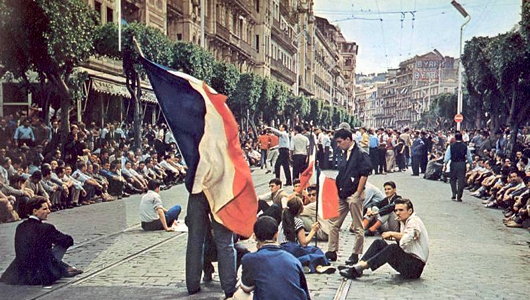
(Only interesting, I’m afraid, to those reasonably acquainted with the situation of France in May 1958)
• The French-Algerian instigators of the military rebellion led by Salan didn’t know what to make of him when he was first appointed to Algeria so they decided, just to be on the safe side, to assassinate him on his first day on the job. Salan survived the bazooka attack on his office but his ADC was killed. The general later became the only socialist freemason to lead a right-wing terror group (the OAS).
• Once the Algiers rebellion commenced and travel between Algeria and metropolitan France was cut, many supporting figures made their way across the Mediterranean by whatever means at hand. Soustelle managed to escape his police guards and get to Algiers via a secretly chartered Swiss plane, but the more romantically inclined Roger Frey — later Minister of the Interior — first tried to get to Algiers on the actor Errol Flynn’s yacht. It didn’t pan out, and instead he was forced to hire the boat of an English ex-naval officer turned smuggler.
• The man in charge of wiretapping French telephones was unsure which side would emerge on top so cautiously refrained from giving the government the full picture of the information his wiretaps revealed.
• When Corsica was seized by the rebels, Moch, the Interior Minister, decided to send in the elite of the police force, the CRS. He was afraid, however, that military transport planes would fly them directly to Algeria, so he was forced to commission Air France planes instead. Upon landing in Corsica, the entire CRS contingent was met by the rebel parachute regiment and immediately defected to the rebellion.
• So widespread was the reluctance to support the government against the military rebels that even the meteorologists send false warnings of storms in the Mediterranean in the hopes of keeping the French Navy from moving against the rebels in Algiers.
• The air force was particularly keen for de Gaulle to take power, and took to flying planes in a Cross of Lorraine formation, as well as sending troop transport planes to Algeria in case they would be needed to invade mainland France.
• Regional military commanders in France varied in their loyalty to the government and sympathy for the rebels. One commander is alleged to have told the regional prefect “M. le Préfet, I am not here to defend your préfecture, but to take it.” Other prefects warned the cabinet that any orders for the police to arrest those suspected of aiding the rebellion might result in the prefects instead being arrested themselves.
• The government had sometimes ordered firemen to unleash their water hoses against rioters in the past. As popular support for the cabinet faded away, the head of the fire brigade felt compelled to inform ministers that his men would not take part in any anti-riot measures but would merely put out any fires that erupted. “And,” he said, referring to the home of France’s National Assembly, “in the Palais Bourbon, they wouldn’t bother.”
• As Philip Williams reports in his article “How the Fourth Republic Died”:
At that night’s cabinet Pleven summed up: “We are the legal government, but what do we govern? The Minister for Algeria cannot enter Algeria. The Minister for the Sahara cannot go to the Sahara. The Minister of Information can only censor the press. The Minister of the Interior has no control over the police. The Minister of Defence is not obeyed by the army.” Said a left-wing Gaullist in the Assembly, “You are not abandoning power — it has abandoned you.”
Thierry d’Argenlieu
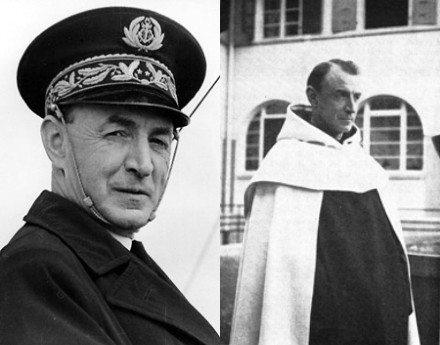
Today we bring you the story of a man known as both Brother Louis of the Trinity, OCD, and Admiral Georges Thierry d’Argenlieu.
D’Argenlieu graduated from the Ecole Navale in Brest and was awarded the Legion d’Honneur for his actions in the Great War. After the war, he became a Carmelite friar, taking the name of Louis de la Trinité. As the Second World War commenced, he once again put on the uniform and partook in the defence of France from the pagan Nazis. Once France was vanquished, he escaped to London where he allied himself with General de Gaulle and the Free French Forces, eventually becoming the commander of the Free French Naval Forces. At the Liberation of the Paris, he strode down the Champs Elysée with de Gaulle and Leclerc and attended the Te Deum at Notre-Dame.
Incidentally, he was also the one who suggested the adoption of the Croix de Lorraine as the symbol to differentiate the Free French Forces from those of Vichy France.
In 1947 however, while Governor-General of Indochina, his request to leave the Armed Forces was granted, and he returned to life as a Carmelite, dying at the Priory of Avon in 1964.
More about Admiral d’Argenlieu/Father Louis here, here, and here.
Search
Instagram: @andcusack
Click here for my Instagram photos.Most Recent Posts
- Burns Tower April 19, 2024
- Patrick in Parliament March 18, 2024
- Articles of Note: 13 March 2024 March 13, 2024
- Cambridge March 9, 2024
- Taken on Trust March 4, 2024
Most Recent Comments
Book Wishlist
Monthly Archives
Categories

